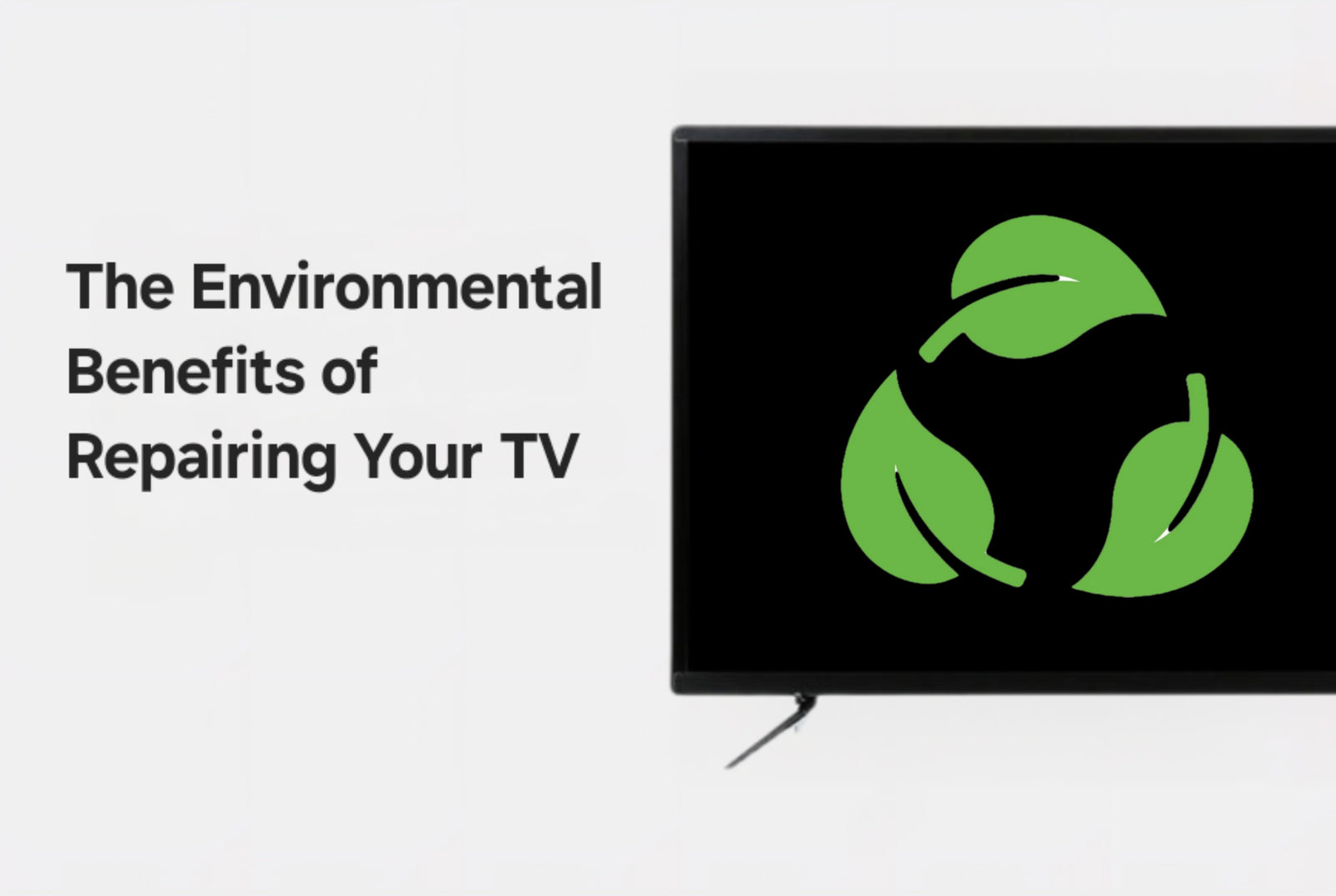In today’s fast-paced world of electronics, it’s easy to fall into the trap of tossing out and trading up. But did you know that repairing your TV instead of replacing it can be a powerful way to protect the environment? At TVpartsToday, we believe that every fix matters... not just for your wallet, but for the planet too!
The Impact of Electronic Waste on the Environment
Electronic waste, or e-waste, is more than just old TVs and broken gadgets lying around, it’s one of the fastest-growing waste streams on Earth. When electronics like TVs are improperly discarded, they can leak toxic metals such as lead, mercury, and cadmium into the soil and water. Burned e-waste releases hazardous chemicals into the air, affecting ecosystems and human health alike.
According to the United Nations:
- E-waste has a direct impact on both environmental and human health.
- Small household electronics, like toasters and portable TVs, make up a huge portion of e-waste.
- Even solar panels are adding to the growing global waste pile.
TVpartsToday Tip:
Recycle responsibly or repair when possible. Every television saved from the landfill helps reduce contamination and waste!
Why Repairing Beats Replacing Your TV
Repairing your TV isn’t just smart, it’s sustainable. Here’s why choosing to fix your existing set can make a real difference:
- Environmental Conservation: Fewer TVs in landfills means less toxic waste.
- Resource Efficiency: It takes a lot of energy and raw materials to make a new TV. Repairing keeps those resources in use longer.
- Local Economy Support: TV repair shops and technicians often work in your community, support them instead of big-box stores.
Plus, replacement parts are more accessible than ever. Whether you’re searching for Emerson TV parts, Hisense boards, or Vizio power supplies, finding what you need online is easy... and affordable!
TVpartsToday Tip:
Search by part number to find compatible parts faster and avoid buying the wrong components!
Understanding the Benefits of TV Repair
Reducing Electronic Waste
Choosing to repair helps you be part of the solution. Every TV saved from the scrap heap is one less item contributing to the e-waste crisis.
- Extended Lifespan: Keep your TV running longer and avoid premature disposal.
- Raw Material Reduction: No need to extract new metals and plastics when your current set still works!
- Energy Conservation: New TVs require tons of energy to produce. Repairs save that energy for more important things.
TVpartsToday Tip:
Even a simple fix like replacing a TV backlight inverter or power board can breathe new life into your television.
Conserving Resources and Energy
Manufacturing electronics is energy-intensive. From mining rare earth elements to powering factories, new TVs have a hidden environmental cost. Here's how repairs help:
- Reduces demand for raw minerals like lithium, cobalt, and copper.
- Lowers your carbon footprint by eliminating the need for new production.
- Promotes a cycle of reuse, keeping more devices out of landfills.
Extending Product Lifespan
Repairing your TV isn’t just about fixing a broken part, it’s about preserving what you already have. Extending the life of your electronics is one of the most impactful things you can do as a consumer.
- Reduces waste
- Saves money in the long run
- Cuts down demand for unnecessary new production
How TV Repair Contributes to a Circular Economy
A circular economy means products are reused, repaired, and recycled, not discarded. Instead of the typical “take-make-dispose” approach, a circular system keeps valuable materials in use for as long as possible.
Key Elements:
- Design for repairability
- Maintain and refurbish devices
- Recycle components into new devices
TV repair plays a key role in this model by giving devices a second (or third!) life. Instead of buying new, you’re minimizing waste and keeping valuable components in circulation.
TVpartsToday Tip:
Most TVs have modular components. Don’t junk the whole set, just replace the faulty board, components, or LED strips!
TV Repair as a Form of Recycling
Think of repairing your TV as recycling with a purpose. You’re not just preventing waste, you’re actively keeping plastics, metals, and electronics in the loop.
- Prevents release of toxic chemicals
- Reuses valuable components
- Reduces demand for new materials and energy
Every repair is a choice that supports a more sustainable electronics cycle.
Practical Tips for Repairing Your TV
When to Consider Repair Over Replacement
Not sure whether to fix or toss? Here’s when repair makes sense:
- Minor issues: Backlight problems, faulty HDMI ports, or capacitor damage are usually inexpensive to fix.
- Still under warranty? Repairs could be free!
- TV age: If it’s under 5 years old, fixing it is often more cost-effective.
- Cost check: If the repair is under half the cost of a new TV, repair is almost always worth it.
TVpartsToday Tip:
Check online troubleshooting guides or contact a professional for a diagnosis before making your decision. We offer a host of guides on our YouTube channel, as well as troubleshooting advice via phone/email completely FREE OF CHARGE!
Finding the Right Repair Service
Once you’ve chosen repair, finding a good tech is key. Look for:
- Strong reviews
- Certified experience with your TV brand
- Warranties on parts and service
- Clear, competitive pricing
Try searches like “Samsung TV repair near me” or “LG TV motherboard replacement” to find local shops that know their stuff.
TVpartsToday Tip:
Use platforms like Yelp or Google Reviews to compare service providers before committing.
Final Thoughts: Repairing Is Caring
TV repair is more than just a practical choice, it’s a powerful act of environmental stewardship. By choosing to fix your TV instead of replacing it, you help reduce e-waste, conserve precious resources, support the local economy, and lower your environmental footprint.
At TVpartsToday, we’re here to help you make smarter, more sustainable repair choices with access to reliable parts, expert advice, and real solutions.
Need Help?
If you’re still unsure about the issue or need to replace a part, reach out to TVpartsToday. We can help you identify the exact cause of the problem and provide the right replacement part!
Would you rather watch a video? Check out our helpful Troubleshooting 101 playlist over on YouTube!
Would you rather chat with a seasoned repair expert? Head on over to our TVRepairHelp subReddit!
Need help finding the right board or part?
Call us at 930-212-1975 or browse our inventory online.
DIY-friendly parts, fast shipping, and expert support – only at TVpartsToday.

